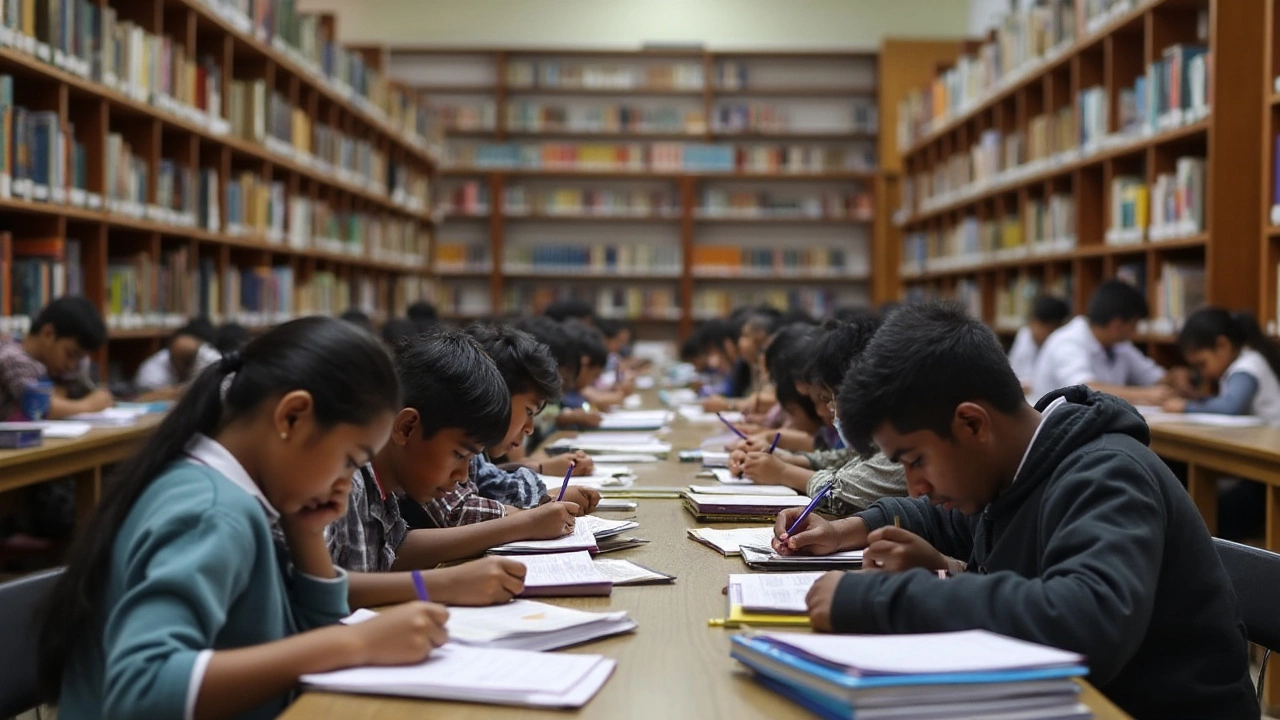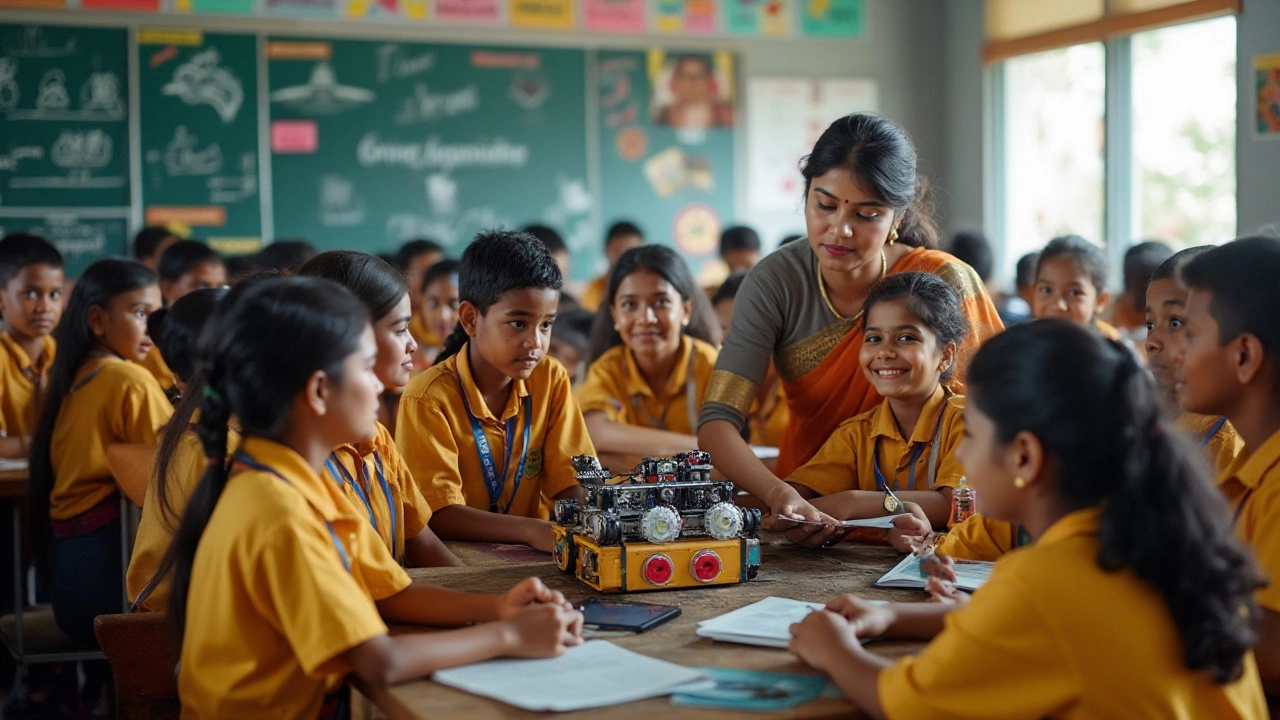India's diversity is not just cultural but intellectual as well. Within this vibrant nation, the quest to find the state with the highest IQ levels often leads to compelling discussions. While it isn't simple to measure intelligence based on geography alone, several factors play into determining which state might just lead in intelligence.
The Central Board of Secondary Education (CBSE) plays a significant role in the educational journey of millions, shaping young minds across various states. Through systematic education protocols, CBSE challenges students, pushing them towards academic pursuit, potentially impacting their intellectual capacities.
We'll take an interesting look at which states possibly outshine others in IQ levels, how CBSE's role influences this, and what can be learned and applied from the leading states to improve educational outcomes. Stay engaged as we unravel the dynamics of education and intelligence in the world's largest democracy.
- Exploring the Link Between Education and Intelligence
- The Role of CBSE in Shaping Intellectual Levels
- Leading States in Intelligence Indicators
- Tips for Enhancing IQ Based on Educational Practices
Exploring the Link Between Education and Intelligence
Education and intelligence have always shared a complex yet crucial relationship, deeply influencing each other. Intelligence, often viewed through the prism of academic achievement, does get nurtured effectively through structured educational systems. In India, especially, education through bodies like the Central Board of Secondary Education (CBSE) plays a pivotal role in shaping the intellectual capabilities of students across diverse cultural landscapes. This relationship isn't just about traditional rote learning; it's about creating environments that foster cognitive development, critical thinking, and robust problem-solving skills. Educational systems act as the scaffolding that supports intellectual growth, encouraging students to push the boundaries of their own understanding and acquire new knowledge actively.
Many experts suggest that intelligence, while partially innate, is significantly shaped by one's environment and educational experiences. According to a study conducted by educationists, among those who engage more deeply with their curriculum requirements, students demonstrate enhanced analytical skills and higher IQ levels over time. An important aspect of this is the emphasis placed by CBSE on holistic education – integrating sports, arts, and academics to create a balanced learning atmosphere. This not only engages different parts of the brain but also promotes emotional intelligence, which is now recognized as an integral part of one's overall intellectual profile.
"Education is not the learning of facts, but the training of the mind to think." - Albert Einstein
The variance in India IQ levels across different states can be partly attributed to the varying educational standards and approaches. States that invest significantly in education infrastructure often see higher average IQ scores among their populations. In Maharashtra and Karnataka, where the focus on STEM (Science, Technology, Engineering, and Mathematics) has been noteworthy, students tend to perform better in national level intellectual competitions. This indicates a direct correlation between educational investments and intellectual outcomes, suggesting that the right inputs in education systems yield fruitful results.
Moreover, intelligence isn't just an individual trait; it's reflected in societal progress and innovation driven by collective minds. Leading states in educational performance often also lead in economic and technological advancements, thus reinforcing the significance of a robust education system. It's interesting to note how Kerala, with its high literacy rates, has reported citizens with some of the highest cognitive skills nationally. The state's dedication to equitable education access has evidently resulted in superior intellectual outcomes, illustrating how governmental policies can significantly impact intelligence levels across regions.
In summary, the connection between education and intelligence is undeniable and profound. While educational frameworks like the CBSE curriculum lay the foundation, it is the consistent effort to innovate and integrate new teaching methodologies that truly uplifts a state’s intellectual stature. By understanding these dynamics, we gain insights into how education shapes intelligence and how, in turn, educated individuals contribute to the fabric of society.

The Role of CBSE in Shaping Intellectual Levels
The Central Board of Secondary Education, commonly known as CBSE, stands as one of India’s premier educational bodies, responsible for shaping the academic fabric of millions of students across the country. It’s not just a board but a paradigm that defines how knowledge is imparted and intellects are honed. At its core, CBSE emphasizes a balanced curriculum that promotes analytical and logical thinking—a cornerstone in fostering higher IQ levels. Over the decades, CBSE has kept evolving, aligning its policies with global educational standards, ensuring that students are not just rote learners but critical thinkers.
One of the hallmarks of the CBSE system is its structured approach, which integrates contemporary subjects and a practical understanding of core concepts. Unlike traditional methods, where students might focus solely on memory-based learning, CBSE encourages problem-solving abilities. Its comprehensive syllabus encompasses a wide range of subjects from science and mathematics to humanities, each intertwined with continuous assessment methodologies. CBSE’s Continuous and Comprehensive Evaluation (CCE) system is a pioneering step towards holistic education, addressing both scholastic and co-scholastic areas to enhance students’ cognitive skills.
For instance, the introduction of coding at a young age in schools follows the CBSE’s forward-thinking approach, fostering computational skills among students. This progressive strategy clearly highlights the role this educational body plays in nurturing young, high-performing minds. The regular revision of the syllabus taking into account vocational skills, life skills, and ethical education further shapes the students’ personality, ensuring they are well-rounded individuals. One might argue that while standardization is rigid, CBSE's approach to updating its curriculum to include current affairs and technological advancements keeps the learners informed and adaptable.
The National Education Policy 2020 (NEP), which harmonizes well with CBSE’s vision, states, "Education will be experiential, holistic, integrated, inquiry-driven, discovery-oriented, learner-centric, discussion-based, flexible, and, of course, enjoyable."
While the CBSE board exams are often synonymous with a high-pressure environment, with the right guidance, they train students to manage stress and timelines effectively, an integral skill in intellectual growth. Moreover, the CBSE curriculum being the backbone for various national level entrance examinations such as JEE and NEET, gives students a head start in national and international competitive arenas. These structured exams require in-depth understanding and application, hence raising the bar for intellectual standards.
It’s significant to note that, according to recent data, a notable percentage of students who achieve top ranks in these examinations often hail from CBSE schools, speaking volumes about the board's efficacy in grooming some of the brightest minds. The board’s emphasis on encouraging sports, arts, and co-curricular activities alongside academics also plays a key role in cognitive development, as diverse stimuli are known to enhance brain function and creativity.
In conclusion, the CBSE’s robust framework is undoubtedly centered on improving educational outcomes by integrating critical thinking, modern skills, and adaptability, all of which are essential facets of high intelligence. As parents and educators continue to appreciate the holistic educational model CBSE offers, it cultivates not just students with excellent academic prowess but responsible citizens ready to tackle future challenges in the global landscape.

Leading States in Intelligence Indicators
When examining the landscape of IQ levels across India, certain states have emerged as prominent leaders. These states have not only invested significantly in their educational infrastructure but also adopted innovative teaching methods that resonate well with the CBSE curriculum. Among these, states like Kerala, Tamil Nadu, Delhi, and Maharashtra frequently come under the spotlight due to their strong academic performance and advanced cognitive strides made by their students.
Kerala, for instance, boasts the highest literacy rate in the country, a foundational cornerstone when discussing high IQ levels. Rooted deeply in a culture that values education, the state provides an environment where students are encouraged to think critically and engage with their studies actively. This commitment to education is supported by substantial government initiatives to enhance school facilities and teacher training programs. It is no surprise that many of India's bright minds, shaped by such educational policies, emerge from Kerala.
"Education is not the filling of a pail, but the lighting of a fire," wrote W.B. Yeats, which perfectly captures the spirit of educational enthusiasm in states like Tamil Nadu and Kerala.
Similarly, Tamil Nadu has posed as a fierce competitor in this intellectual race. The state has been at the forefront of implementing technology-enabled learning solutions within schools. This modern approach helps in making the CBSE curriculum accessible and engaging through digital means, potentially increasing IQ levels by promoting problem-solving and analytical thinking skills among students. Furthermore, Tamil Nadu's emphasis on research-based learning instills a scientific temper at an early age.
Delhi and Maharashtra are also noteworthy mentions where education is emblematic of determined strategic efforts. Delhi, serving as the political and administrative nucleus of India, not only harbors some prestigious schools but also benefits from consistent educational reforms aimed at optimizing teaching standards. The capital city often features competitive academic atmospheres that prepare students for nationwide entrance examinations, indirectly boosting IQ through intensive preparation and exposure to a variety of subjects and disciplines.
Maharashtra stands out in its commitment to diversity and inclusion in education. It balances the urban-rural divide in educational access, which is crucial for building IQ equity across demographics. The state actively supports multilingual education, helping students become adaptive and culturally aware, which are essential components of modern intelligence.
The journey towards identifying the state with the highest IQ in India extends beyond mere metrics. It's a tapestry woven with cultural values, policy initiatives, and the collaborative efforts of educators and communities. In doing so, these states have crafted environments where aspiring minds thrive, setting benchmarks for others to follow.
For those curious about the numbers, a quick glance at the National Achievement Survey (NAS) or Programme for International Student Assessment (PISA) findings often reveals performance patterns that underscore the aforementioned states. Although direct IQ measurement at the state level can be elusive, educational achievements offer a glimpse into the cognitive capabilities harbored within these regions.

Tips for Enhancing IQ Based on Educational Practices
Boosting IQ levels isn't an overnight achievement; it requires a well-rounded approach steeped in effective educational practices. A critical starting point is fostering a learning environment that champions curiosity and critical thinking. Encouraging questioning in classrooms rather than rote learning can significantly impact cognitive development. When students feel free to explore subjects beyond the textbook, their intellectual horizons expand. Schools that prioritize open discussion often see students develop better problem-solving skills, which is instrumental in enhancing IQ.
One effective way to amplify intelligence is through integrating technology into learning. Access to digital resources and interactive learning platforms encourages students to engage with content in diverse ways, catering to multiple learning styles. With tools such as educational apps and online simulations, students can grasp complex concepts through visual and hands-on experiences, aiding better retention and understanding. Bridging traditional methods with modern technology can create a more enriching educational experience, leading to heightened intelligence levels.
Encouraging Holistic Development
The road to nurturing a high IQ isn't just academic; it's about holistic development that includes arts, sports, and social skills. Incorporating extracurricular activities into the CBSE curriculum helps students build varied intelligences. For instance, music education has been linked to improved mathematical capabilities due to its inherent patterns and rhythm. Meanwhile, sports not only boost physical health but also develop strategic thinking and teamwork skills, all essential components of a robust intellectual profile.Moreover, the importance of quality over quantity in studying cannot be overstated. Effective learning strategies, such as spaced repetition and active recall, enhance memory capabilities far better than cramming sessions. Active involvement in what is being learned, such as teaching back the material, discussing it with peers, or applying it practically, significantly boosts understanding and IQ development. A renowned educator once said,
"Education is not the learning of facts, but the training of the mind to think," reflecting the essence of effective educational practices.
Nutrition and Cognitive Health
An often overlooked facet of improving IQ is the role of nutrition. A balanced diet rich in Omega-3 fatty acids, proteins, and antioxidants supports brain health. Schools in India that incorporate nutritional programs see a notable improvement in student performance. A fascinating study revealed that children with regular access to nutritional meals performed better in cognitive tasks than those without. By prioritizing both education and health, states can ensure students develop fully to their cognitive potential.Finally, parental involvement is another key component. At-home support and creating a culture of learning play a crucial role in shaping a child's intellectual development. Parents who engage with their children’s education, whether it's through helping with homework or encouraging inquisitive discussions, lay a foundation that complements formal education. As the bridge between home and school fosters stronger, students' IQ levels can reflect this enriched environment.
